Coal Companies Point Fingers as Local Residents Contend With Flood and Home Damage
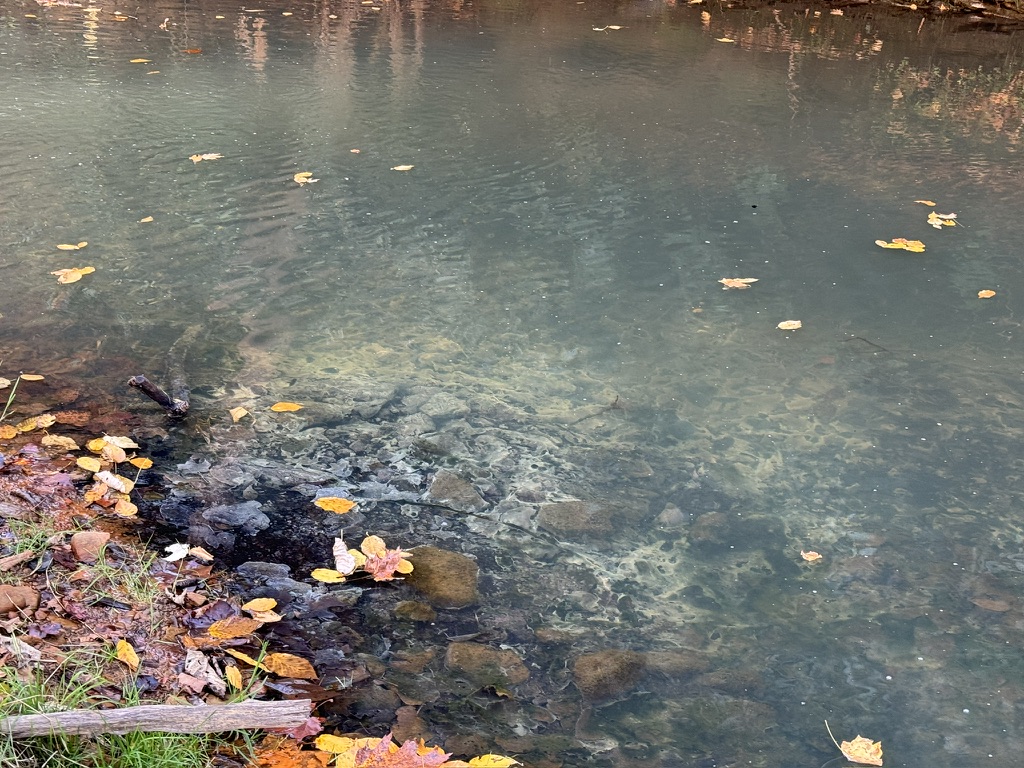
Residents have noticed a strange slime in Indian Creek after water shooting up out of the ground was diverted to the creek. Photo by Dan Radmacher
By Dan Radmacher
There are strange things happening near Wolf Pen, West Virginia, about seven miles north of Welch.
Geysers of water have shot up out of the ground in some places. Elsewhere, wells have gone dry. Building walls have cracked. Strange slime has shown up in streams. A dead buck with no apparent wounds was found partially submerged in a creek.
The most dramatic strangeness occurred on Feb. 21, 2023, when Jamie and Tina Christian woke up to a yard flooded by a geyser erupting behind their double-wide trailer. A similar geyser was jetting up out of the ground just down the road.
The West Virginia Department of Environmental Protection sent an inspector to look into what was happening. He concluded the water was being forced out of the ground by internal pressure — known as “artesianing” — because of what was then an unauthorized discharge of coal mine water from the nearby Pinnacle Mining Complex into an inactive underground mine. Underground mines in this area require constant pumping to keep from flooding.
The inspector issued an “Imminent Harm Cessation Order” directing Pinn MC Wind Down Company, known as the Pinnacle Mining Company prior to a 2018 bankruptcy, to stop all mining operations and take all necessary actions to prevent discharges from the mine.
When the company failed to take action, DEP took them to court in March 2023, asking the judge for a preliminary injunction ordering the company to deal with the situation.
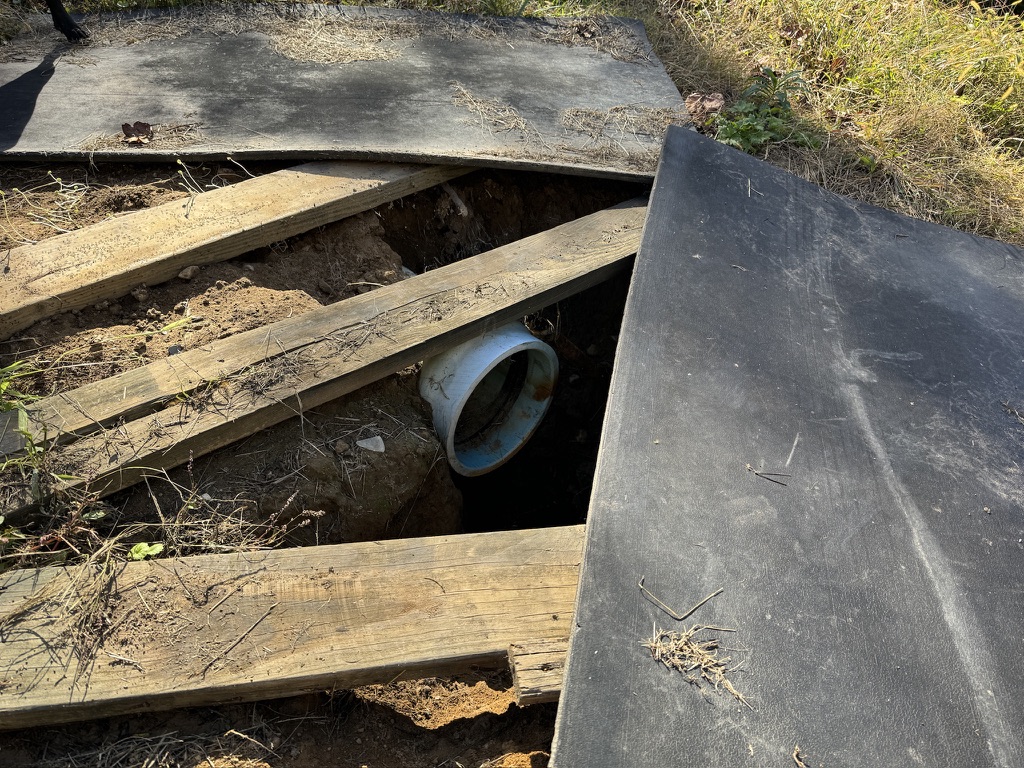
The drainage pipe Jamie Christian installed to keep water from pooling his yard. Photo by Dan Radmacher
After nearly a year of back-and-forth in court, little action has resulted and the case is still pending. Jamie Christian put in his own drainage pipe running from where the water was gushing out from the ground to Indian Creek behind his home. Eventually, the court ordered Pinn MC Wind Down to put in a rock-lined drainage ditch that runs from the geyser down the road into the same creek, and obtain a water pollution permit for the discharge.
Pinn MC Wind Down Co., has repeatedly denied responsibility, arguing that most of the Pinnacle Mine Complex had been purchased by Bluestone Resources, a company owned by West Virginia Gov. Jim Justice’s family. But DEP has yet to transfer the accompanying permits, leaving responsibility for the mines in limbo.
Bluestone, in turn, argued that the discharge was coming from a portion of the Pinnacle complex that was sold to Contura, which merged with Alpha Natural Resources in April 2018.
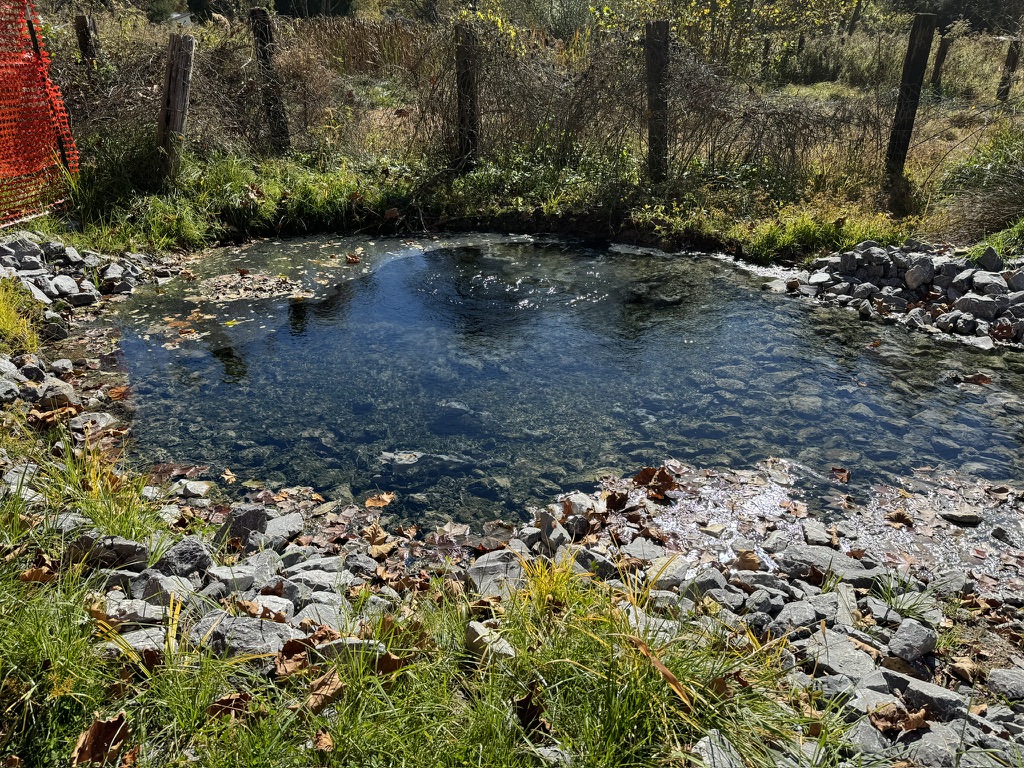
Water continues to bubble up from a well near the Christians’ property. A drainage ditch now channels the water to Indian Creek due to a court order. Photo by Dan Radmacher
“This case really shows how the modern mine reclamation system is failing local communities,” says Matt Hepler, Central Appalachian environmental scientist for Appalachian Voices, the nonprofit organization that publishes The Appalachian Voice. “Coal companies point their fingers at each other and even when regulators try to hold someone accountable, it can be almost impossible when the coal companies are in bankruptcy. In the meantime, communities live with the consequences.”
In addition to confusion caused by bankruptcy, companies’ failure to secure transfer of permits and other issues, the area’s long history of mining also makes determining accountability difficult. It can be very hard to pinpoint the exact cause of problems like this.
Sometimes, the only thing that does seem clear is that people living nearby pay the price.
“The coal companies don’t care about people like us,” Jamie Christian says.
Jamie and Tina Christian have nine grandchildren between them. For months after the yard flooded, they kept them away.
“When the water first went under our trailer and in our front yard, we didn’t know what was in it, so we told the kids to keep the grandkids away till we knew it was safe,” Tina Christian says. “That was really hard on us. We’re used to seeing them almost every day.”
The Christians worry about what’s flowing into the creek behind their house from the mine drainage.
“That creek used to be full of fish,” Tina Christian says. “My kids and grandkids caught fish all the time. They’re gone.”
Jamie Christian and family friend Richard Altizer, who’s had his own issues with property damage he attributes to coal mining under his home, spend a lot of time traveling the area and trying to make sense of what’s happening.
Altizer regularly posts lengthy videos on social media, highlighting various mysteries and inconsistencies with the explanations from DEP and the coal companies. They have theories about what’s causing the artesianing — Altizer believes the water is flowing from Alpha Natural Resources mines through a barrier breach. But solid answers are hard to come by.
“I think DEP is happy to let Pinnacle take the fall,” Altizer says. “They’re bankrupt anyway.”
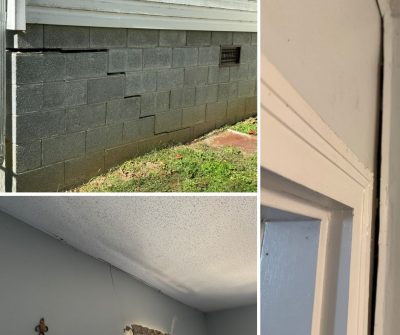
The foundation of the Indian Creek Community Church is showing multiple cracks, cracks have appeared where the ceiling meets a wall, and wood trim is separating from an interior wall. Photos by Dan Radmacher
The Indian Creek Community Church next door to the Christians’ property hasn’t seen the same kind of flooding, but cracks have been showing up in the foundation and there are problems with interior doors and walls. Jerry Morgan, a church deacon, believes the site is experiencing mine subsidence — when the surface begins to sink into underground voids created by mining.
“It’s been going on three or so years,” Morgan says. “Every time you come in, you see something else.”
In addition to the visible cracks in the foundation, there are also signs inside that the church is settling and twisting — drywall panels pulling away, door frames askew, bows in the ceilings.
“If something isn’t done, it’s just gonna fall in,” Morgan says.
The church has talked with state regulators, but hasn’t gotten any satisfactory answers.
“They won’t give you a straight answer about anything,” Morgan says.
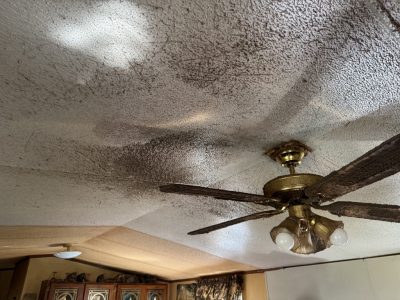
Mold visible on the Christians’ ceiling has appeared since their yard flooded last year. Photo by Dan Radmacher
Nearly a year after the flooding, the Christians are still dealing with the consequences. The flooding ruined their heat pump, which they haven’t been able to replace. They’re seeing mold grow in their home as well as signs that their home is also settling.
Meanwhile, the court case between DEP and Pinn MC Wind Down continues with no clear resolution in sight.
“People like us are the ones who get hurt,” Jamie Christian says.
Related Articles
Latest News

Leave a comment
Your email address will not be published. Required fields are marked *
5 responses to “Coal Companies Point Fingers as Local Residents Contend With Flood and Home Damage”
-
I would suggest the folks who live in W Va vote all the supporters of the coal industry out of office and also begin to investigate clean energy, updating homes with proper insulation, etc. With all those mountains I would think wind power would be a natural. Once you have cleaned up the legislature you may even have a chance at Fossil Fuel Superfund legislation to apportion blame and track down the location of some of the money which made your governor and his friends filthy rich.
-
I think David Ball summed up the solution very well. The coal industry has manipulated government agencies and regulators for its profits at the demise of the health and survival of coalfield communities. In Illinois, the Department of Natural Resources/Office of Mines and Minerals/Land Reclamation Division has compromised our farmland by approving longwall mining permits. Flat farmland that is subsided 7-8 feet creates a bathtub effect that does not drain and produces massive erosion. Coal is toxic and should stay underground.
-
What’s needed is for WV politicians to stop pandering to coal companies and step up to protect the people of this state!!
-
I want to say something beyone “this is terrible,” because we all know it is.
Can’t some mine clean up funds be used here– although they are underfunded.
Ultimately, is the state responsible for over the years not enforcing cleanups or doing proper monitoring? And I also wonder – how can we stop things like this from repeating? It’s an injustice! -
That’s Despicable and definitely something needs to be done. My father served in Air Force and came home and worked in coal mine and died of black lung


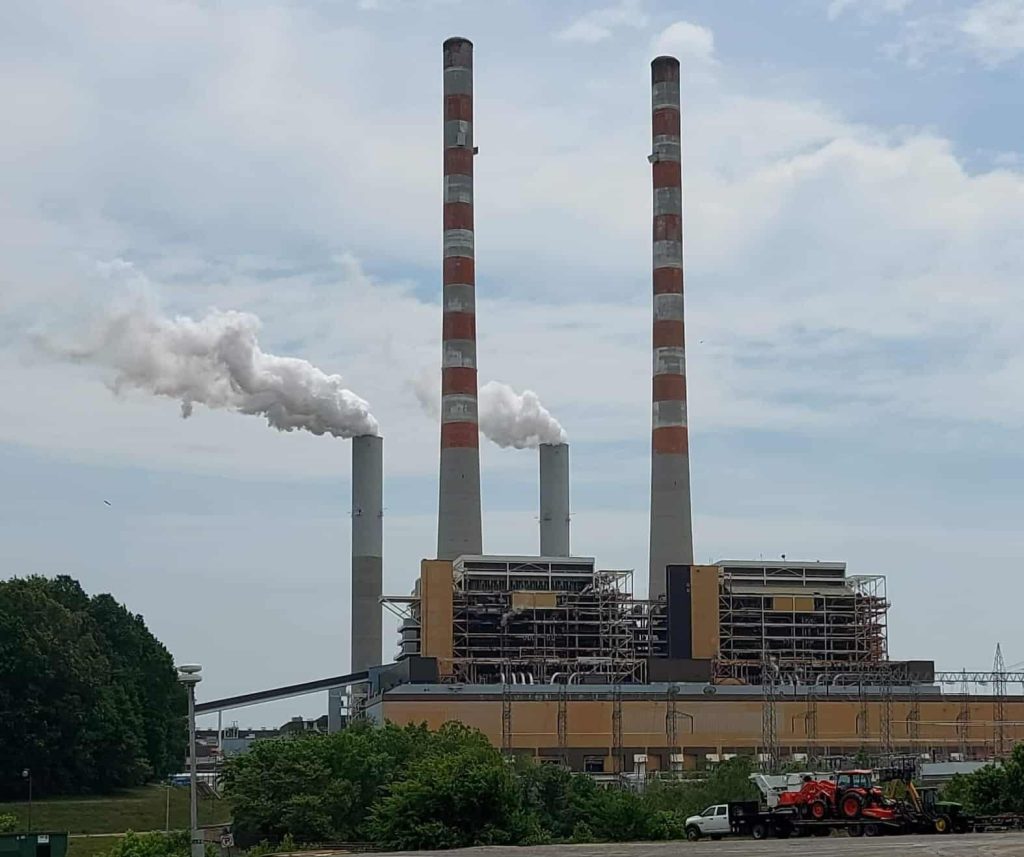

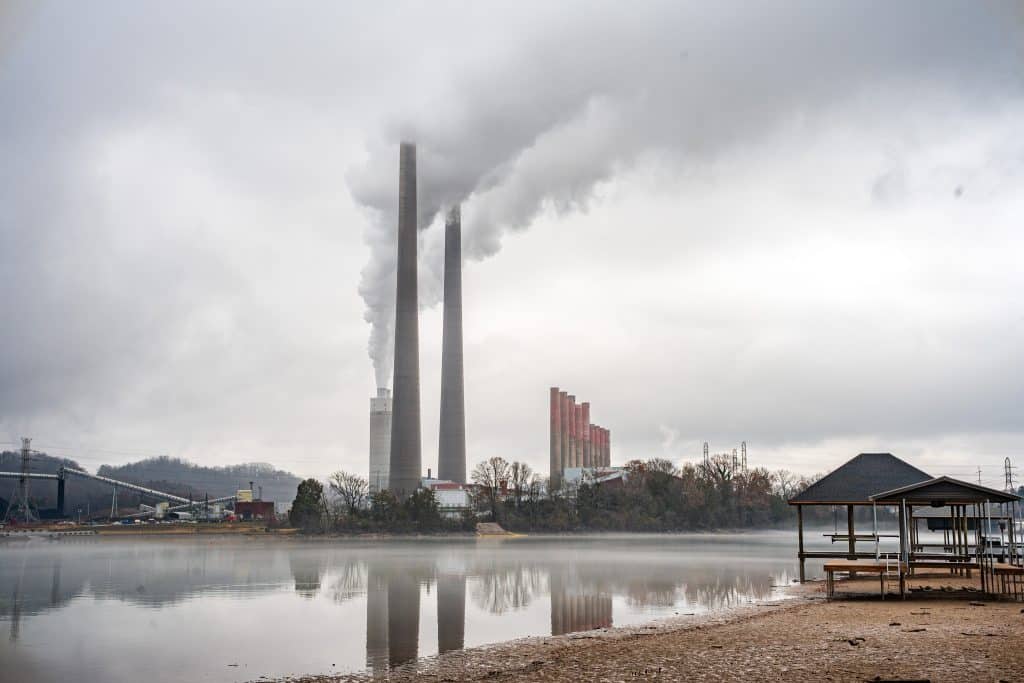
Leave a Comment